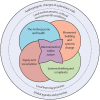Integrating planetary health education into tertiary curricula: a practical toolbox for implementation
- PMID: 39512618
- PMCID: PMC11541711
- DOI: 10.3389/fmed.2024.1437632
Integrating planetary health education into tertiary curricula: a practical toolbox for implementation
Abstract
Objective: To present a series of case studies from our respective countries and disciplines on approaches to implementing the Planetary Health Education Framework in university health professional education programs, and to propose a curriculum implementation and evaluation toolbox for educators to facilitate the adoption of similar initiatives in their programs. We emphasize the importance of applying an Indigenous lens to curriculum needs assessment, development, implementation, and evaluation.
Methods: Case studies from Australia and United States were collated using a six-stage design-based educational research framework (Focus, Formulation, Contextualization, Definition, Implementation, Evaluation) for teaching planetary health and methods of curriculum evaluation. These components were then mapped to derive the curriculum implementation toolbox reflecting the six-stage design-based educational research framework.
Results: The case studies demonstrated different approaches to successful integration of the Planetary Health Education Framework in medicine, nursing, public health, and allied health disciplines. This integration often involved Indigenous perspectives on environmental stewardship, holistic health, and community well-being into the curriculum. The case studies also highlighted the importance of community engagement, cultural competency, and interdisciplinary collaboration in curriculum development. Findings from case studies were used to propose a curriculum implementation toolbox to assist educators in adapting and integrating planetary health education into their own programs.
Discussion: While valuable frameworks for teaching planetary health in health science programs exist, challenges remain in implementing these frameworks in real-world educational environments. The proposed curriculum implementation toolbox offers practical strategies and resources for educators to incorporate these principles into their teaching. Additionally, the case studies reported here contribute to the growing body of literature on planetary health education pertinent to addressing the triple planetary crisis.
Keywords: climate change; curriculum development; education; environment; implementation; planetary health.
Copyright © 2024 Lokmic-Tomkins, Barbour, LeClair, Luebke, McGuinness, Limaye, Pillai, Flynn, Kamp, Leder and Patz.
Conflict of interest statement
The authors declare that the research was conducted in the absence of any commercial or financial relationships that could be construed as a potential conflict of interest.
Figures




Similar articles
-
Concept and implementation of the longitudinal mosaic curriculum planetary health at the Faculty of Medicine in Würzburg, Germany.GMS J Med Educ. 2023 May 15;40(3):Doc33. doi: 10.3205/zma001615. eCollection 2023. GMS J Med Educ. 2023. PMID: 37377573 Free PMC article.
-
Student and educator experiences of maternal-child simulation-based learning: a systematic review of qualitative evidence protocol.JBI Database System Rev Implement Rep. 2015 Jan;13(1):14-26. doi: 10.11124/jbisrir-2015-1694. JBI Database System Rev Implement Rep. 2015. PMID: 26447004
-
[The elective planetary health: Climate, environment and health at the faculty of medicine in Würzburg: Concept, didactic methods and evaluation results].Z Evid Fortbild Qual Gesundhwes. 2024 May;186:92-103. doi: 10.1016/j.zefq.2023.12.001. Epub 2024 Apr 4. Z Evid Fortbild Qual Gesundhwes. 2024. PMID: 38575437 German.
-
International Planetary Health Education in Undergraduate and Graduate Medical Curricula: A Scoping Review.J Grad Med Educ. 2024 Dec;16(6 Suppl):58-68. doi: 10.4300/JGME-D-24-00027.1. Epub 2024 Dec 13. J Grad Med Educ. 2024. PMID: 39677906 Free PMC article.
-
A Scoping Review of Planetary Health Education in Pharmacy Curricula.Am J Pharm Educ. 2025 Mar;89(3):101374. doi: 10.1016/j.ajpe.2025.101374. Epub 2025 Feb 13. Am J Pharm Educ. 2025. PMID: 39954786
References
-
- Development WC on E. Brundtland GH, Khalid M. Our common future. Oxford, GB: Oxford University Press; (1987).
-
- The Intergovernmental Panel on Climate Change . (2024) About — IPCC. Available at: https://www.ipcc.ch/about/ (Accessed May 23, 2024).
-
- UNFCCC . What is the Triple Planetary Crisis?. (2022) Available at: https://unfccc.int/news/what-is-the-triple-planetary-crisis (Accessed March 18, 2024).
-
- Intergovernmental panel on climate Change (Ipcc) . Climate Change 2022 – Impacts, adaptation and vulnerability: Working group II contribution to the sixth assessment report of the intergovernmental panel on climate Change. 1st ed. New York, NY, USA: Cambridge University Press; (2023).
-
- World Health Organization . Climate change. (2024) Available at: https://www.who.int/health-topics/climate-change (Accessed March 18, 2024).
LinkOut - more resources
Full Text Sources

